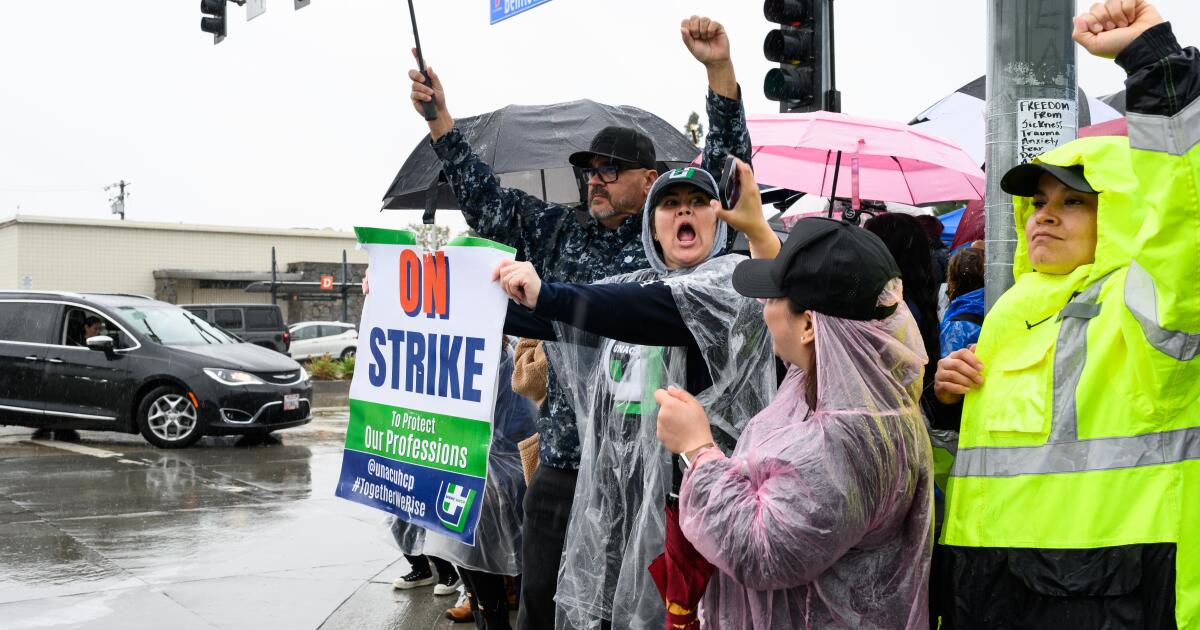Business
Kaiser healthcare worker strike ends after five days. Bargaining resumes this week

A five-day strike that affected hundreds of Kaiser Permanente clinics and hospitals in California and Hawaii came to an end after the union representing workers said it had “new momentum” to head back to the bargaining table, but no apparent agreement has been reached.
“This strike may be over — but the fight for patient safety is not,” the United Nurses Assns. of California/Union of Healthcare Professionals, known as UNAC/UHCP said in a statement. “Caregivers are returning to work united, energized, and ready to keep up the pressure for a fair contract that puts patients first.”
Kaiser and union officials are set to resume bargaining on Wednesday and Thursday.
The union requested a wage increase of 25% over four years, an ask that union officials have said was needed to compensate for the smaller 2% increases workers received in the first year as part of their 2021 contract negotiations.
The union has also pushed for the additional hiring of more staff, and proposed an internal registry of on-call union nurses, so that the company doesn’t rely on contracted traveling nurses.
Kaiser officials have argued that employees on average earn 16% more than peers in the industry, and that the wage increases proposed raised their “already above-market wages over the 4-year contract.”
Company officials said the company offered a 21.5% wage increase over four years before the strike was called, as well as additional improvements to medical plans and retiree benefits.
Kaiser officials said workers returned to work Sunday at 7 a.m.
During the strike, facilities were staffed with doctors, managers and nearly 6,000 contracted nurses and clinicians to minimize disruption to care, officials said.
On Sunday, the UNAC/UHCP announced the end of the strike, stating that the labor action was “sending a resounding message that patient care and safe staffing must come first.”
The union pointed to new staffing standards released by the Joint Commission, a nonprofit that accredits healthcare organizations, that recognized adequate staffing as a component of providing needed care.
The new standard moves staffing levels away from an employer’s choice that could be affected by budget constraints, to a patient safety standard, the union said in a statement.
“The Joint Commission has finally said what nurses have known all along: Unsafe staffing is unsafe care,” said Charmaine S. Morales, president of the UNAC/UHCP in the statement. “It’s now a national patient safety mandate — and UNAC/UHCP will make sure it’s enforced.”
Officials at Kaiser said it was welcoming back the 30,000 employees who went on strike, but in a statement said the main point of contention at the bargaining table has been wages, not staffing.
“While the Alliance has publicly emphasized staffing and other concerns, wages are the reason for the strike and the primary issue in negotiations,” said Terry Kanakri, spokesperson for Kaiser, in a statement.
During bargaining, “the focus will be on economic issues,” Kanakri said in the statement. “At a time when the cost of healthcare continues to go up steeply, and millions of Americans are having to make the difficult choice to go without coverage, it’s critical that we keep quality, accessible healthcare coverage affordable.”
Meanwhile union officials have blasted the company for holding $66 billion in reserves and expanding projects in other states.

Business
NLRB sues California over new law empowering state agency to enforce federal labor rights

The National Labor Relations Board has sued California to block a law that empowers a state agency to oversee some private-sector labor disputes and union elections.
Gov. Gavin Newsom signed Assembly Bill 288 into law last month in response to the Trump administration’s hampering of federal regulators. It gives the state’s Public Employment Relations Board the ability to step in and oversee union elections, charges of workplace retaliation and other issues in the event the federal labor board is unable, or declines, to decide cases.
The lawsuit, filed Wednesday in U.S. District Court for the Eastern District of California, argues the law usurps the NLRB’s authority “by attempting to regulate areas explicitly reserved for federal oversight.”
The lawsuit echos the NLRB’s challenge to a recent New York law that similarly seeks to expand the powers of its state labor board.
NLRB attorneys contend in the lawsuits that the laws create parallel regulatory systems that conflict with federal labor law.
The NLRB is tasked with safeguarding the right of private employees to unionize or organize in other ways to improve their working conditions.
Lawmakers in New York and California said they passed their bills to fill a gap, because the NLRB has been functionally paralyzed since January, when President Trump fired one of its Democratic board members. The unprecedented firing of that member, Gwynne Wilcox, left the board without the three-member quorum it needs to rule on cases.
Wilcox has challenged her firing in court, arguing that appointed board members can only be fired for “malfeasance or neglect of duty.” But her removal was upheld by the Supreme Court for now, until her case can make its way through lower courts.
Lorena Gonzalez, president of the California Federation of Labor Unions, last month called AB 288 “the most significant labor law reform in nearly a century.”
The California Public Employment Relations Board typically has authority only over public sector employees. But when the new law goes into effect on Jan. 1, workers in the private sector who are unable to get a timely response at the federal level can also petition the state board to take up their cases and enforce their rights.
The state’s labor board can choose to take on a case when the NLRB “has expressly or impliedly ceded jurisdiction,” according to language in the law. That includes when charges filed with the agency or an election certification have languished with a regional director for more than six months — or when the federal board doesn’t have a quorum of members or is otherwise hampered.
The NLRB’s paralysis has put hundreds of cases in limbo, with the agency currently lacking the ability to compel employers to bargain with their workers’ unions, or to stop unfair treatment on the job.
However, the agency’s acting general counsel — Trump appointee William Cowen — has said that only a fraction of cases require decisions from the typically five-member board and that the agency’s work has been largely unaffected, with regional offices continuing to process union elections and unfair labor practice charges.
Business
Trump administration terminates Citibank consent order prohibiting Armenian American discrimination

The Consumer Financial Protection Bureau has terminated a consent order that prohibited Citibank from discriminating against its Armenian American customers.
The agency, led by President Trump’s Office of Management and Budget Director Russ Vought, ended the consent order on Thursday, three years earlier than when it was set to expire.
The termination order signed by Vought said the bank had already paid more than $24.5 million in penalties and redress payments required by the agreement, and that it had taken steps to prevent future violations of the law. The order also waived any allegations of non-compliance.
Citibank entered into the consent order in November 2023 after it was accused of applying more stringent criteria or even blocking the accounts of credit card applicants in and around Glendale with surnames ending in “ian” and “yan.”
The bank suspected that those applicants seeking new cards or higher limits would be more likely to commit fraud, with some employees referring to them as “Armenian bad guys” or the “Southern California Armenian Mafia,” according to the consent order.
The agency also also found that the bank took “corrective action” against employees who failed to identify and deny the applications. Employees were ordered not to tell customers the real reasons for their rejections or to discuss it in writing or on recorded lines.
The agency’s findings focused on Citigroup’s retail-services division, which houses the bank’s co-brand credit-card partnerships with such companies as Home Depot and Best Buy.
The bank did not admit or deny the CFPB’s findings and did not respond immediately to a request for comment Friday.
California Democratic Sen. Adam Schiff blasted the decision to end the consent agreement.
“Once again, this administration is putting big corporations ahead of the people,’” he said in a statement. “This choice, to take the side of the bank against the wronged in the face of the most plainly discriminatory conduct, will cast a long shadow over the community.”
The CFPB did not respond to an email inquiry for comment.
Glendale is home to about 15% of the Armenian American population in the U.S, with Los Angeles County having a population of about 250,000 of the ethnic group.
The settlement prompted litigation against the bank by hundreds of customers, some of whom said they not only had their credit card applications rejected but even had accounts closed after years with Citibank.
“Although this does not affect our pursuit of Citibank for its discrimination against Armenian Americans in our community, this is still a slap in the face to the Armenian Americans in Los Angeles County, many of whom support our president,” said Glendale attorney Tamar Armanak, whose firm filed a number of the ongoing lawsuits.
Business
Beyond Meat’s stock collapses after debt deal

What does it cost a company when it’s no longer in the zeitgeist? For stockholders in Beyond Meat, perhaps as much as 99% of their money, if they bought at the top of the market.
Shares of the El Segundo maker of plant-based meats, an investors’ darling a few year ago, collapsed this week to less than $1 after the company wrapped up a deal to reduce its debt burden. The deal involves issuing up to 326 million new shares to the note holders.
The stock-diluting deal was spurred by declining sales at the company, which makes pea-based foods that mimic the taste of beef, chicken and pork.
It’s a stark reversal for Beyond Meat, whose products were in big demand early in the pandemic but are now less so as consumer tastes have shifted back to animal meats amid a surge of interest in protein.
“Animal meats are in the true cyclical fashion of consumer trends, having a moment that currently leaves less room for our products and brand,” founder and Chief Executive Ethan Brown told analysts during the company’s August conference call. “You’ve got these cultural moments that occur. And we happen to be on the other side of the particular moment.”
Beyond Meat went public in 2019 in an initial stock offering that saw its shares almost triple in price and then hit nearly $235 within months, as the public, restaurant chains and the media alike were captivated by the new food technology, which made plant-based burgers more than just palatable.
After that initial wave of interest, however, a number of its high-profile restaurant deals petered out and the company experienced a steady decline in sales from a peak of $465 million in 2021 to $326 million last year — all while never earning a profit. Second quarter sales were off 20%, losing the company $29.2 million.
Shares closed at 67 cents Wednesday, down 14%.
Beyond Meat also faces competition from chief rival Impossible Foods in Redwood City, Calif., which has made sales gains at supermarkets and is available as a Whopper at Burger King.
Beyond Meat has not been alone in its struggles. The entire U.S. plant-based meat and seafood industry saw a 28% drop in unit sales and an 18% drop in revenue to $1.17 billion over the last two years, according to a report by the Good Food Institute, a nonprofit that advocates for alternative proteins. The downturn also hit markets outside the U.S.
Inflation at the supermarket has made U.S. consumers less willing to buy premium-priced products, including plant-based proteins. That led some markets to move the products from refrigerated displays next to animal meats to the freezer, where they are harder to find, according the report.
Emma Ignaszewski, the institute’s associate vice president of corporate engagement, said that although there may be a “protein boom” she thinks that the plant-based companies can succeed if their products are positioned correctly.
“Plant-based proteins really need more investment, more innovation to match conventional meat on the factors that matter most to consumers, and that’s taste, price and accessibility,” she said.
“These products …. often cost two to three to four times more than their conventional counterparts. So when the wallet’s hurting this is not where people are turning to. Also, many products continue to lag consumer expectations on taste,” she said.
Beyond Meat did not respond to emails for comment, but Brown laid out his plan for boosting sales and turning a profit during the last conference call.
The company has been reducing its head count, and in August laid off 44 more employees, or about 6% of its total global workforce. It also hired a “chief transformation officer” who will focus on reducing operating expenses and increasing efficiency.
However, key to the company’s comeback are new product offerings, amid a growing consumer dislike of processed foods — a tag that has stuck with plant-based meats after a public relations campaign financed by the meat industry. Brown calls it a “headwind of misinformation.”
U.S. Health Secretary Robert F. Kennedy Jr.’s Make America Healthy Again movement also has targeted processed foods.
Last year, the company released a new version of its flagship Beyond Burger that reduced its saturated fat content, and a product line called Beyond Sun Sausage with fewer and less-processed ingredients.
It also has tested a new product called Beyond Ground that has only a handful of ingredients, including faba bean and potato protein. Brown told analysts that the test went well on the company’s social channels. And it has released a steak filet at select restaurants.
The company wants to reduce prices, as well as to “counter misinformation around our products,” Brown said. Last year, its new burger earned endorsements by the American Diabetes Assn. and Good Housekeeping. The American Heart Assn. has included the product in its recipe collection.
We know “that the extreme nature of the current renaissance around animal protein will, as consumer trends do, moderate. This moderation may occur solely with time, new information or new trends, or may be spurred on by a set of related factors, including pricing pressure, droughts and genetic disease outbreaks,” he told analysts.
Bloomberg News contributed to this report.
-

 Augusta, GA1 week ago
Augusta, GA1 week ago‘Boom! Blew up right there’: Train slams into semi in Grovetown
-

 Alaska5 days ago
Alaska5 days agoMore than 1,400 seeking shelter as hundreds wait to be evacuated after catastrophic Western Alaska storm, officials say
-

 Education1 week ago
Education1 week agoVideo: 3 Former College Teammates Reunite on Rangers Coaching Staff
-

 North Carolina1 week ago
North Carolina1 week agoGuide to NC State Fair 2025: Tickets, transportation, parking, new rides and special event days
-

 Education1 week ago
Education1 week agoNearly 20 Percent Fewer International Students Traveled to the U.S. in August
-

 News1 week ago
News1 week agoWhat we know about the charges against New York’s Attorney General Letitia James
-

 World1 week ago
World1 week agoAlbanian judge killed in courtroom shooting amid growing anger over justice system reforms
-

 News5 days ago
News5 days agoTrump Halts Billions in Grants for Democratic Districts During Shutdown













